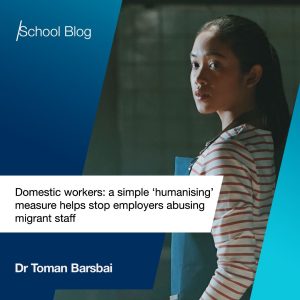 Seeing family photos softened employers’ behaviour towards employees in a study from Dr Toman Barsbai.
Seeing family photos softened employers’ behaviour towards employees in a study from Dr Toman Barsbai.
By Michelle Kilfoyle.
On their first day of work abroad in 2014, nearly 1000 women each presented their new employer with a small packet of dried mango and a photo of their family.
The result? The employers were less likely to sexually harass and verbally abuse the women, and more likely to pay their salaries on time.
The women were taking part in an experiment by Toman Barsbai, Associate Professor in Economics at the University of Bristol, in collaboration with the Philippine government and an international research team. The study’s aim: to stop householders from mistreating their migrant domestic workers.
Employer abuse of Filipino domestic workers
Barsbai is interested in helping people make the difficult decision of whether to migrate – and in increasing their chances of success when they do. “People move when the benefits of migration exceed its costs,” he explains. “And the costs are not just the plane ticket.”
For the 272 million people living outside their country of origin, overseas work has profound benefits. They earn much higher incomes, which they share with their families back home. In 2018, migrants sent home remittances worth US$689 billion – four times more than official development assistance provided that year.
These migrants include the many women who leave their homes and loved ones in the Philippines to escape poverty by cleaning, cooking and caring for families in private households.
But as for many migrant workers, this temporary move often comes at a major cost to the women’s welfare. In Barsbai’s own survey of Filipino domestic workers in Saudi Arabia, many said: “they had been treated poorly by members of the employer’s household and had not felt respected as human beings,” he reports. “Some said they felt to be considered ‘slaves’ or ‘machines.’”
More specifically, 5% of Filipino domestic workers in Saudi Arabia and Hong Kong, both common destination countries, said they had been sexually harassed by their employer. Eight per cent reported being physically assaulted, 27% did not receive their payment on time and 60% were not allowed a weekly day of rest.
Click here to read the complete article.
See more from Dr Toman Barsbai, including recent publications.
Discover more research from the School of Economics on our website.

